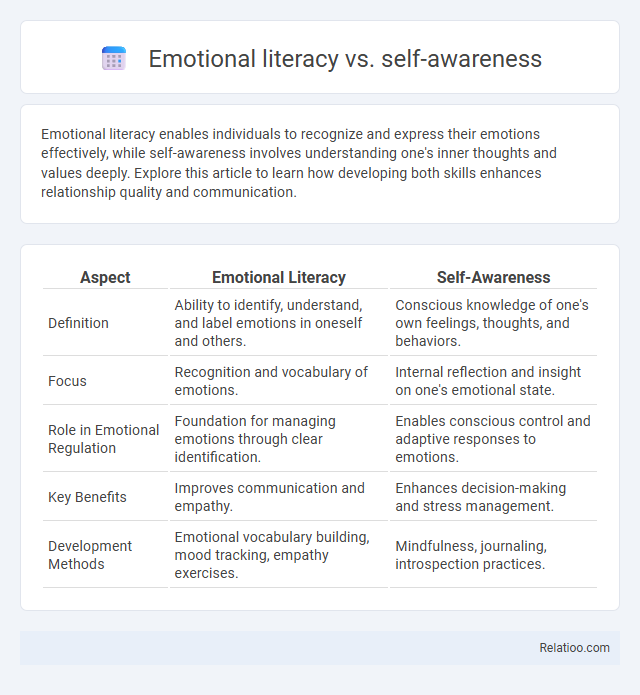Emotional literacy enables individuals to recognize and express their emotions effectively, while self-awareness involves understanding one's inner thoughts and values deeply. Explore this article to learn how developing both skills enhances relationship quality and communication.
Table of Comparison
| Aspect | Emotional Literacy | Self-Awareness |
|---|---|---|
| Definition | Ability to identify, understand, and label emotions in oneself and others. | Conscious knowledge of one's own feelings, thoughts, and behaviors. |
| Focus | Recognition and vocabulary of emotions. | Internal reflection and insight on one's emotional state. |
| Role in Emotional Regulation | Foundation for managing emotions through clear identification. | Enables conscious control and adaptive responses to emotions. |
| Key Benefits | Improves communication and empathy. | Enhances decision-making and stress management. |
| Development Methods | Emotional vocabulary building, mood tracking, empathy exercises. | Mindfulness, journaling, introspection practices. |
Introduction to Emotional Literacy and Self-Awareness
Emotional literacy involves recognizing, understanding, and expressing your emotions accurately, which forms the foundation for effective interpersonal communication. Self-awareness builds on this by enabling you to introspectively identify your emotions and their impact on your thoughts and behaviors. Developing both emotional literacy and self-awareness enhances emotional intelligence, leading to improved decision-making and relationship management.
Defining Emotional Literacy
Emotional literacy involves recognizing, understanding, and expressing emotions accurately, forming the foundation for effective interpersonal communication and empathy. Self-awareness focuses more narrowly on identifying one's own emotions and internal states to gain insight into personal behaviors and motivations. Distinguishing emotional literacy emphasizes the ability to interpret both personal and others' emotional cues, which is essential for social interaction and emotional regulation.
Understanding Self-Awareness
Self-awareness involves recognizing and understanding one's own emotions, thoughts, and behaviors, serving as the foundation for emotional literacy, which extends to identifying and managing emotions effectively. Emotional literacy encompasses self-awareness but also includes skills like empathy, emotional expression, and interpersonal communication. Understanding self-awareness is crucial for developing emotional literacy, as it enables individuals to accurately perceive their emotions and respond constructively in various contexts.
Key Differences Between Emotional Literacy and Self-Awareness
Emotional literacy involves recognizing, understanding, and expressing emotions accurately, while self-awareness focuses on a deeper insight into your own thoughts, feelings, and behaviors. The key difference lies in emotional literacy's emphasis on managing and communicating emotions effectively, compared to self-awareness, which centers on internal reflection and personal growth. Developing emotional literacy enhances your ability to navigate social interactions, whereas self-awareness fosters a clearer understanding of your inner self.
The Role of Emotional Literacy in Personal Development
Emotional literacy involves recognizing, understanding, and expressing emotions effectively, which serves as a foundation for personal development by enhancing your ability to manage relationships and navigate social complexities. Self-awareness focuses on the conscious knowledge of your character and feelings, allowing deeper introspection but relies on emotional literacy to interpret those emotions accurately. The role of emotional literacy in personal growth is pivotal; it equips you with the tools to communicate authentically and respond empathically, fostering emotional resilience and stronger interpersonal connections.
The Importance of Self-Awareness for Mental Health
Self-awareness plays a crucial role in mental health by enabling individuals to recognize and understand their emotions, which is foundational for effective emotional literacy. Developing self-awareness helps identify emotional triggers and patterns, fostering better emotional regulation and reducing stress and anxiety. Enhanced emotional literacy, rooted in self-awareness, supports healthier relationships and promotes overall psychological well-being.
How Emotional Literacy Enhances Relationships
Emotional literacy enhances relationships by enabling you to accurately recognize and express your emotions, fostering improved communication and empathy with others. Self-awareness, a component of emotional literacy, allows deeper understanding of your emotional triggers, which helps to manage reactions and build stronger interpersonal connections. Developing emotional literacy cultivates trust and emotional intimacy, essential for healthy and lasting relationships.
Building Self-Awareness: Practical Strategies
Building self-awareness involves recognizing your emotions, thoughts, and behaviors to better understand how they influence your actions and relationships. Emotional literacy complements this by helping you identify and express emotions accurately, while self-awareness deepens your insight into personal triggers and patterns. Practical strategies include mindfulness practices, journaling emotional experiences, and seeking feedback to enhance emotional intelligence and personal growth.
Emotional Literacy vs Self-Awareness in the Workplace
Emotional literacy in the workplace involves recognizing, understanding, and effectively expressing emotions, which fosters better communication and interpersonal relationships. Self-awareness, a key component of emotional literacy, focuses on an individual's ability to accurately perceive their own emotions, strengths, and weaknesses, enhancing personal accountability and decision-making. Developing emotional literacy beyond self-awareness equips employees to empathize with colleagues, manage conflict constructively, and promote a positive organizational culture.
Integrating Both Skills for Holistic Emotional Intelligence
Emotional literacy involves recognizing and understanding one's own and others' emotions, while self-awareness focuses on deeper insight into personal thoughts, feelings, and behaviors. Integrating emotional literacy with self-awareness creates a comprehensive emotional intelligence framework that enhances empathy, decision-making, and interpersonal skills. This holistic approach fosters healthier relationships and improved emotional regulation across diverse social and professional contexts.

Infographic: Emotional literacy vs Self-awareness
 relatioo.com
relatioo.com